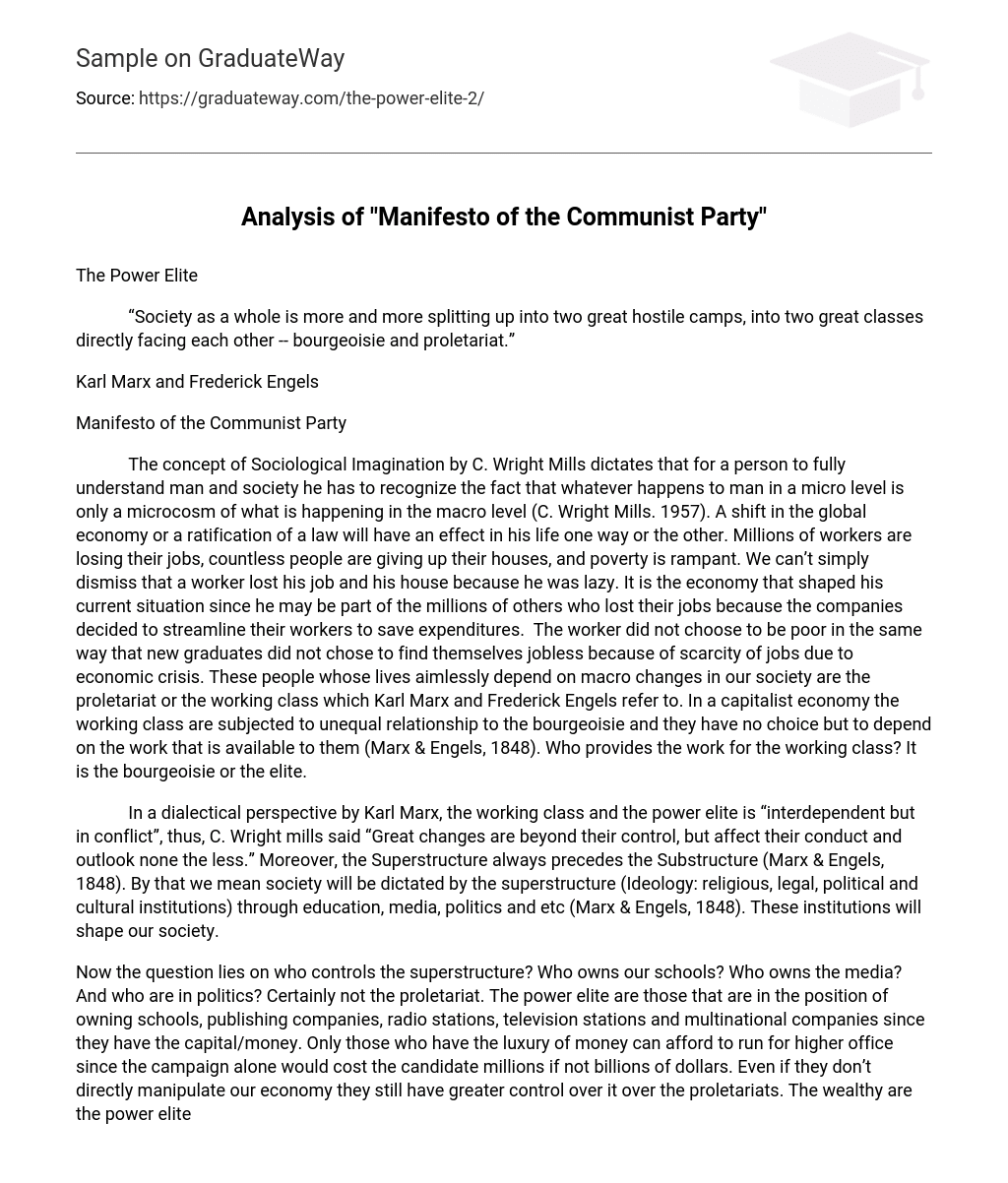The Power Elite
“Society as a whole is more and more splitting up into two great hostile camps, into two great classes directly facing each other — bourgeoisie and proletariat.”
Karl Marx and Frederick Engels
Manifesto of the Communist Party
The concept of Sociological Imagination by C. Wright Mills dictates that for a person to fully understand man and society he has to recognize the fact that whatever happens to man in a micro level is only a microcosm of what is happening in the macro level (C. Wright Mills. 1957). A shift in the global economy or a ratification of a law will have an effect in his life one way or the other. Millions of workers are losing their jobs, countless people are giving up their houses, and poverty is rampant. We can’t simply dismiss that a worker lost his job and his house because he was lazy. It is the economy that shaped his current situation since he may be part of the millions of others who lost their jobs because the companies decided to streamline their workers to save expenditures. The worker did not choose to be poor in the same way that new graduates did not chose to find themselves jobless because of scarcity of jobs due to economic crisis. These people whose lives aimlessly depend on macro changes in our society are the proletariat or the working class which Karl Marx and Frederick Engels refer to. In a capitalist economy the working class are subjected to unequal relationship to the bourgeoisie and they have no choice but to depend on the work that is available to them (Marx & Engels, 1848). Who provides the work for the working class? It is the bourgeoisie or the elite.
In a dialectical perspective by Karl Marx, the working class and the power elite is “interdependent but in conflict”, thus, C. Wright mills said “Great changes are beyond their control, but affect their conduct and outlook none the less.” Moreover, the Superstructure always precedes the Substructure (Marx & Engels, 1848). By that we mean society will be dictated by the superstructure (Ideology: religious, legal, political and cultural institutions) through education, media, politics and etc (Marx & Engels, 1848). These institutions will shape our society.
Now the question lies on who controls the superstructure? Who owns our schools? Who owns the media? And who are in politics? Certainly not the proletariat. The power elite are those that are in the position of owning schools, publishing companies, radio stations, television stations and multinational companies since they have the capital/money. Only those who have the luxury of money can afford to run for higher office since the campaign alone would cost the candidate millions if not billions of dollars. Even if they don’t directly manipulate our economy they still have greater control over it over the proletariats. The wealthy are the power elite.
In a capitalist nation, politics and economy are two entities that can’t be separated. The government needs jobs for its people and companies to offer these jobs. Capitalist or investors are as important as taxes is to the government. In the paper economy the government is biased to the power elite since they not only keep the economy afloat but they also determine the future of the country. The question therefore is not if these power elite exist because according to Marxs’ dialectical perspective, it is the ruling class that dictates the superstructure, therefore the power elite exist.
Perhaps the more fitting question would be who are these power elite who control society? According to C. Wright Mills they are those that belong to the corporate community/capitalist. Whether these elites go out and have picnics like what is written in the book entitled Who rules America? Social Cohesion and the Bohemian Grove by William Domhoff is not much an issue, however it does prove that social cohesion does exist in our society.
As mentioned earlier in Marxs’ dialectical perspective, the relationship of the bourgeoisie and proletariat is interdependent but is conflicting (Marx & Engels, 1848). If these social classes have conflicting interest it is but natural that those with the same interest conspire and form social cohesion. If proletariats have unions and basic organization, the power elites have their cabin and private organizations. In the book written by Domhoff he revealed the elite organization of Bohemian Grove and other elite organizations whose members are often in the same social status. It is but a clear manifestation that unlike the proletariat, the power elite are more organized that what they really seem. They form social cohesion to further protect and prosper the interest of their class.
The bourgeoisie are the power elite who have enough resources to shape society in the macro level. Unlike our example in the first part of the worker who has no control over the economy, these power elite have control over the economy. The macro change in society is but a snap of their finger and a wave of their pen. They are not ordinary men who get controlled by the capitalist nation; hence, they themselves control the system.
While the working class is subjected to exploitation and alienation on their work that they can’t control or claim as their own, the capitalist/power elite has all the capacity to control the mode of production.
References
Marx, K. & Engels, F. 1848. Manifesto of the Communist Party. Retrieved on October 17, 2008 http://www.anu.edu.au/polsci/marx/classics/manifesto.html
C. Wright Mills. 1957. The Power Elite. NY. pp. 269-297.





